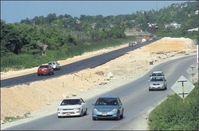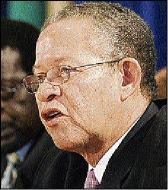Bruce still on the exercise track
Published: Sunday | October 11, 2009

Hewitt
Our prime minister gave a very forthright presentation to the nation in the first hour of Wednesday September 30. He cut to the core of the matter like a professor of pathology and presented to us, his class of '09, the very heart of the nation's problems. He held the heart out to us to be plainly seen from every angle. Yet, as much as there was a significant and even dramatic build-up to the presentation, when delivered, it was disappointedly realised that it was nothing new.
For years, reports to Government and certainly, published articles in The Sunday Gleaner, have reported on and discussed in detail from every viewpoint, the stark reality of our moral, social, physical and economic decline. Who does not know, does not want to know.
We have known for the longest while that after paying interest due on the national debt and public-sector wages, very little is left from the revenue [taxes, fees, etc] collected by government. What remains is insufficient to finance the Budget, and so to try to meet reasonable national expectations and enhance the maintenance of political power, there is an annual necessity to borrow.
We know that at least 80 per cent of our mercantile earnings are currently required to buy petroleum for the nation and that at the present trend, within five years, it may well need all 100 per cent to do so. We know that our education system is still colonialistic and that we cannot afford the cost of training even as much as 30 per cent of our workforce. We cannot afford the cost of a reasonable-quality national health service, nor can we afford the transportation system we need, or even afford pensioners who live for any time.
Yet, we are a people blessed with a lovely country and a people of enormous God-given potential which, after 47 years of Independence and governance by the two major political parties, still frustratingly yearns to be unleashed. Truly, we are too rich to be poor.

Highways ... contributing to a depopulation of rural communities.
UNVARNISHED TRUTH
What was new in Golding's speech was that a prime minister was confessing the unvarnished truth clearly and un-ambiguously. This was Golding at his best, positively in the same league as his 2007 inauguration speech and his earlier launching of the National Democratic Movement (NDM). He held our attention [not easy at 12:05 a.m.] and in brisk, short sentences made the starkness of our situation real.
In these three speeches, he clearly enunciated knowledge of what is wrong with the political system and his view of how to correct it [NDM]; his view of the real potential of this country [inauguration]; and what are the immediate problems of our economy [September 2009]. From the NDM and inauguration speeches - both were before he became prime minister
In this September 2009 speech, the absence of any statement indicating even at minimum, immediate actions to deal with the current emergency was disappointing. After all, the present situation was not parachuted to us but has been loudly building up for more than two decades. The recent global financial meltdown has simply exacerbated what existed previously. After being in office for two years, many expected even a sketch of the likely medium-term programmes leading to sustainable development.
Surely, it is common knowledge by now that the present regressive tax system must be remoulded; that the tax net must be widened and made fair and tax dodgers brought to book - irrespective of political contributions, shade or class.
Surely, it is common knowledge by now that sustainable development requires an expansion of the economy; that such development requires a development plan based on researched knowledge of our physical assets, capacity for services, international trends, educational/training outputs, etc. Surely, the mass of the people must this time be a priority and fully brought into national production.
Given the admitted blundering and the absence of any coherent plan or galvanising vision, it seems obvious that the Jamaica Labour Party (JLP) in Opposition did not maximise the time to fully prepare to govern. As a man whose policies support gambling, the hand he has been dealt was face up on the table. He cannot call for 'time-out', freezing time to allow him to adequately prepare and then resume time. He seems, therefore, to be slowing down immediate expectations, hoping to speed up preparations so as to begin some implementation before the middle of next year. But in the meantime, Jamaica is shrinking while awaiting Bruce's plan for the route the bus must take.
MISSING YEARS
The fact is our country, in terms of serious purposeful economic development, has been marking time for a long while, and from that perspective, these may well be considered 'missing years'. Good things have happened, and even minuscule growth, but economic development has certainly not gained much traction. Our Planning Institute of Jamaica [PIOJ] was chartered to be responsible for continuing socio-economic research and planning to position the country to be always knowledgeably able to pursue economic development. Omar Davies, however, reduced the PIOJ to becoming a department of his ministry largely responsible for monitoring external loans, etc. Missing years!
Golding has moved to correct this and a strategic plan for developed status by 2030 continues to be worked on, but until then, a very important gap - a viable national plan -
Our knowledge of the intrinsic values and applications of our flora, our physical and human resources, is still woefully incomplete, retarding the progress we could have realised. There are other implications. For example, we need to reduce the size of the civil service in central government and its agencies, but this is a large segment of consumers which, unemployed, would negatively affect our private sector and see more job losses. The service has to be reduced [and the economy expanded], but before doing so, training for viable jobs and economic opportunities must become available to civil servants. But what areas of training could we recommend on the basis of our assets and market trends?
Our infrastructure is incomplete, the network of farm roads is in poor condition, the railroad is gone, pirate vehicles make the bus system unprofitable and inefficient, urban travel is chaotic, with peak-hour traffic jams even within residential communities, and there seems to be no order in the development of urban communities. At the same time, rural development is unplanned as by-pass highways et al contribute to a depopulation of the island's interior. There seems to be no order in most things because of the conflicting influence of the political and private-sector insiders, which results in the socio-economic direction being as changeable as the skin of a chameleon. And on what are we expecting development when the work ethic of the civil service is distressingly low?
WHAT'S NEXT?
A Jamaica Labour Party knowledgeable about the width and depth of the national problems and adequately prepared for governance should have been ready from its first day in office to present to the people a vision for all to buy into and by which to be galvanised. This could have been supported by some immediate programmes to be implemented, geared to begin the reduction of government and its cost, such as reducing, by mergers and closures, the over 120 statutory organisations, and at least a sketch of considerations for the medium term. We cannot, however, roll back time.
The alternative government in waiting, Norman Manley's thinking-man's party, is frozen in the year 2007, and the team is largely the same. From the public perspective, there is no new vision and its Progressive Agenda for the nation is still as amorphous as it was in 2007.
Golding, with his back to the wall, and despite his seeming (but given the nature of our politics, understandable) penchant for the private sector, needs to move quickly, and in doing so, he needs to ensure that he gathers around him a knowledgeable and experienced team in especially macro socio-economic planning. There is no need to re-invent the wheel, as there are viable proposals still gathering cobweb on government shelves.
The decisions, made so late in his administration, are going to be difficult and hopefully, made only in the country's interest. Given their harshness, they are not likely be in the interest of Golding, his party or their hold on political power after this term - but it has to be done. History will be kind to him and the JLP and the nation grateful for generations in the future. But more than that, the mass of the people of our country will at long last - from the aspirations of our people under slavery, colonialism and a neo-colonialism in Independence - be able, hopefully, to realise their God-given potential.
"It is not the knowing that is difficult, but the doing," Chinese Proverb

Prime Minister Bruce Golding.

Davies reduced the PIOJ to becoming a department of his ministry largely responsible for monitoring external loans, etc.
Errol Hewitt is an information communications technology consultant. Feedback may be sent to columns@gleanerjm.com.













